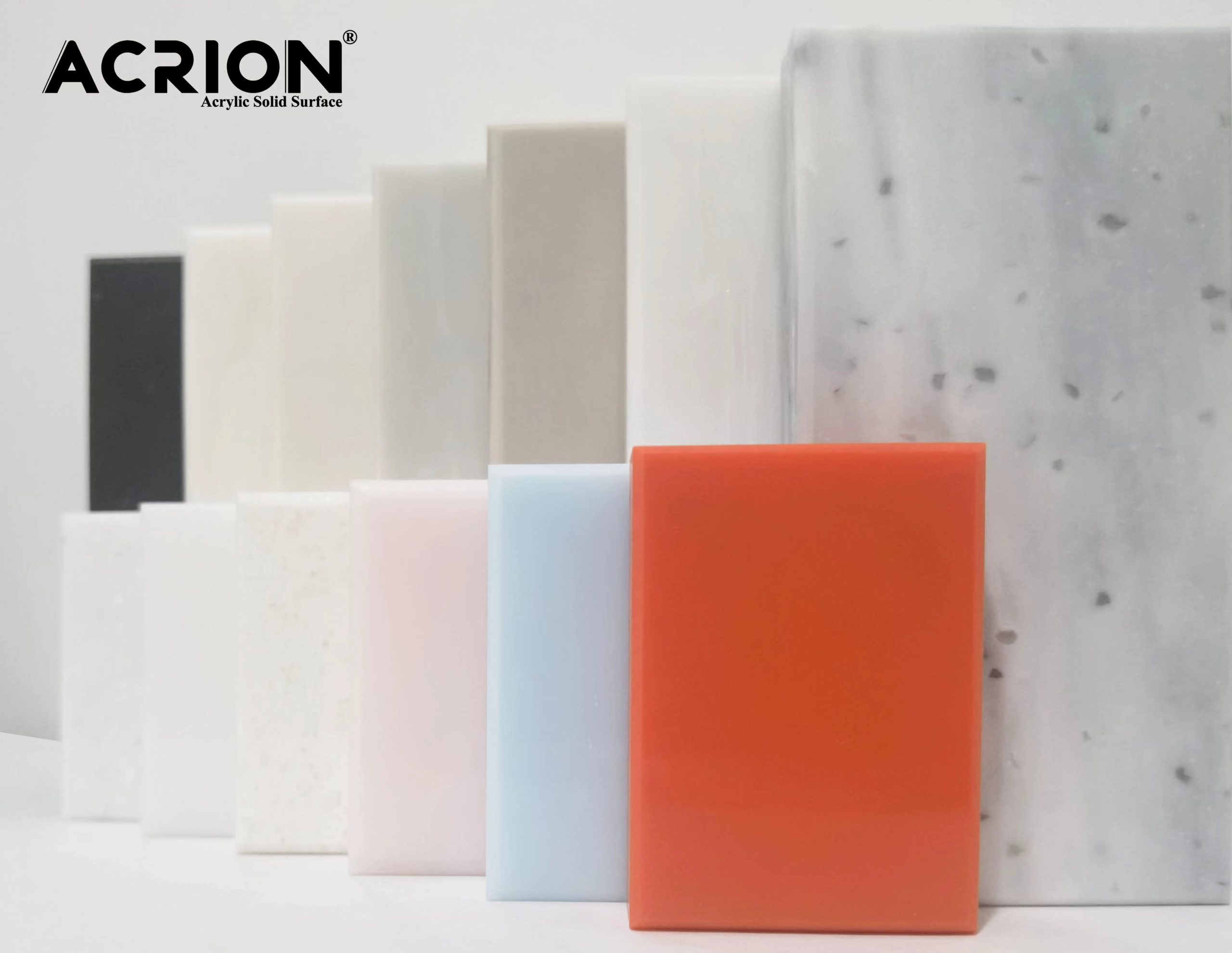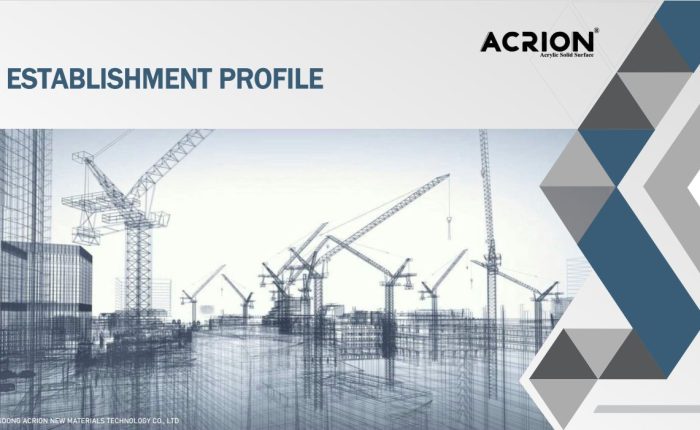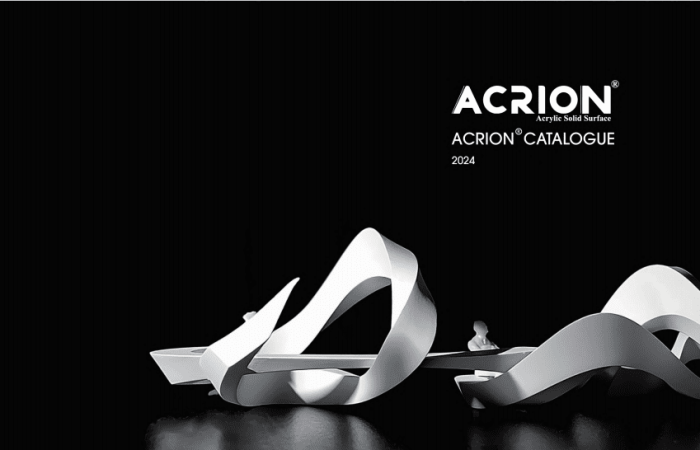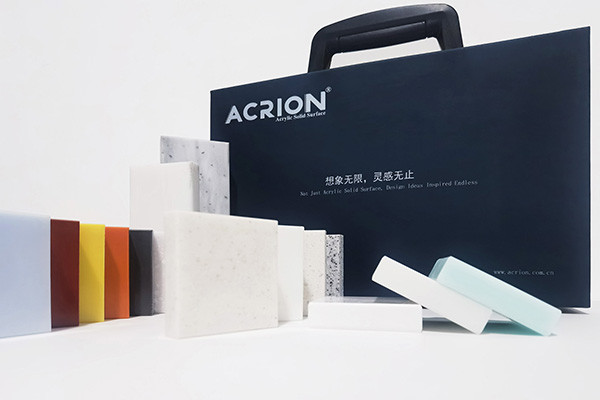Acrion vs comptoirs en pierre fritté: une comparaison détaillée de la prise de décision éclairée
Lorsque vous sélectionnez des comptoirs pour les cuisines ou les salles de bains, compréhension des différences entre l'acrion et la pierre frittée (communément appelée “Dalle de roche” en chinois) est crucial. Les deux matériaux offrent des avantages et des défis uniques, ce qui les rend adaptés à différentes applications en fonction des préférences de conception, des exigences fonctionnelles et des attentes de maintenance.
Composition et processus de fabrication des matériaux
Acrion: un mélange d'acrylique et de minéraux
Acrion est un matériau de surface solide inventé par DuPont dans les années 1960. Il est composé de polymère acrylique (environ 40%) et de minéraux naturels comme le trihydrate d'aluminium (environ 55%), avec des pigments (environ 5%) ajoutés pour la couleur. Ce mélange homogène crée une surface non poreuse et transparente qui peut être moulée en différentes formes et conceptions. Le processus de fabrication permet la personnalisation en termes de couleur, de texture et de motif, faisant de l'acrion un choix polyvalent pour les intérieurs modernes et traditionnels.
Pierre fritté: conçu pour la résistance et l'esthétique
La pierre fritrée est un matériau de haute technologie fabriqué à partir de minéraux naturels comme l'argile, le feldspath et la silice. Ces matières premières sont soumises à une pression extrême (plus de 15 000 tonnes) et à des températures élevées (1200–1500 ° C) dans un processus appelé frittage, qui imite la formation naturelle de la pierre sur des millions d'années. Le résultat est un matériau dense et non poreux avec une résistance, une durabilité et une résistance exceptionnelles à la chaleur, aux rayures et aux taches. La pierre frittée est disponible dans une large gamme de couleurs et de motifs, y compris des dessins qui ressemblent étroitement à la pierre naturelle, au béton ou au métal.
Appel esthétique et flexibilité de conception
ACRION: Intégration et personnalisation transparentes
La surface solide d'Acrion permet des coutures invisibles, créant une apparence unifiée élégante et unifiée. Il peut être moulé en courbes ou intégrés avec des éviers pour une conception fluide. Alors que Acrion offre une variété de couleurs et de motifs, ses conceptions sont généralement plus subtiles et uniformes par rapport à la pierre frittée. La capacité du matériau à être thermoformée permet la création de formes et de bords uniques, ajoutant une touche d'élégance à tout espace.
Pierre fritté: apparence de pierre réaliste et motifs audacieux
La pierre fritrée excelle dans la reproduction de la beauté naturelle de la pierre, avec des options allant de la veine en marbre aux motifs audacieux et contemporains. Ses dalles à grand format (jusqu'à 3200x1600 mm) réduisent le besoin de coutures, ce qui le rend idéal pour de vastes surfaces comme les îlots de cuisine ou les vanités de salle de bain. La capacité du matériau à être produite dans des profils ultra-minces (aussi minces que 3 mm) ouvre de nouvelles possibilités pour des designs légers et modernes.
Durabilité et résistance à l'usure quotidienne
ACRION: Durabilité modérée avec réparabilité
Acrion est modérément durable mais plus sensible aux rayures et aux coupes par rapport à la pierre frittée. Bien qu'il puisse résister à une utilisation quotidienne, des objets tranchants ou des impacts lourds peuvent laisser des marques. Cependant, la réparabilité d'Acrion est un avantage significatif - les rayures Minor peuvent souvent être polies avec du papier de verre, restaurant sa finition d'origine. Le matériau est également résistant à la chaleur mais pas à l'épreuve de la chaleur, donc des bagatelles ou des coussinets chauds sont recommandés pour les pots chauds et les casseroles.
Pierre fritté: résistance exceptionnelle et faible entretien
Les pierres frittées se classent parmi les matériaux de comptoir les plus durables disponibles. Sa densité élevée et sa dureté (l'échelle MoHS de 6 à 7) le rendent résistant aux rayures, aux puces et aux fissures. Le matériau est également très résistant à la chaleur, capable de résister à une exposition directe à des températures élevées sans dommage. De plus, la pierre frittée est non poreuse, empêchant la croissance des bactéries et élimine le besoin de scellement. Ses faibles exigences d'entretien en font un excellent choix pour les ménages occupés ou les paramètres commerciaux.
Exigences de maintenance à long terme
Acrion: polissage régulier pour une brillance durable
Acrion nécessite un entretien minimal mais bénéficie d'un polissage périodique pour maintenir son éclat. Évitez les nettoyeurs abrasifs, qui peuvent émousser la surface au fil du temps. Au lieu de cela, utilisez un détergent doux et un chiffon doux pour le nettoyage quotidien. Pour les taches plus profondes, une pâte de nettoyage non abrasive peut être appliquée. La nature non poreuse d'Acrion facilite le nettoyage, mais une attention rapide sur les déversements est recommandée pour empêcher la coloration.
Pierre fritté: entretien sans effort avec nettoyage de routine
La surface non poreuse de la pierre fritrée rend exceptionnellement facile à nettoyer. Une simple lingette avec du savon et de l'eau est généralement suffisante pour éliminer la saleté et la crasse. Contrairement à la pierre naturelle, la pierre fritrée ne nécessite pas de scellage ou de traitements spéciaux, ce qui réduit les coûts d'entretien à long terme. Sa résistance aux taches, aux rayures et à la chaleur garantit qu'elle reste nouvelle pendant des années avec un minimum d'effort.
Impact environnemental et durabilité
ACRION: Recyclable et basse émission
Acrion est fabriquée avec la durabilité à l'esprit, incorporant des matériaux recyclés dans la mesure du possible. Il est également certifié Greenguard pour les faibles émissions chimiques, contribuant à une qualité de l'air intérieur plus sain. À la fin de sa vie, Acrion peut être recyclée dans de nouveaux produits, réduisant les déchets. De plus, sa durabilité garantit qu'elle reste fonctionnelle pendant des décennies, minimisant le besoin de remplacements fréquents.
Pierre fritté: production écologique et longévité
Le processus de production de Fintered Stone est conçu pour minimiser l'impact environnemental, certains fabricants utilisant des matériaux recyclés dans leurs formulations. La longévité du matériel réduit le besoin de remplacements, en conservant davantage les ressources. La pierre fritrée est également 100% recyclable, et sa nature non poreuse empêche la croissance des moisissures ou des bactéries, contribuant à un environnement de vie en meilleure santé.
Adébabilité pour différentes applications
ACRION: Idéal pour les conceptions personnalisées et les fonctionnalités intégrées
La flexibilité de l'acrion le rend parfait pour les conceptions personnalisées, telles que les comptoirs courbes ou les éviers sans couture. C'est également un choix populaire pour les vanités de salle de bain et le revêtement mural en raison de sa résistance à l'humidité et de sa facilité de nettoyage. La capacité d'Acrion à être thermoformée permet des applications créatives comme des bords arrondis ou des formes uniques, ce qui en fait un favori parmi les concepteurs qui cherchent à repousser les limites.
Pierre fritté: polyvalent et performant
La résistance et la résistance à la chaleur de Stone le rendent adapté aux applications intérieures et extérieures, y compris des comptoirs de cuisine, des hauts de bar et même des entourages de cheminée. Sa large gamme de couleurs et de motifs garantit qu'il complète tout style de conception, du traditionnel au moderne. Les dalles de grand format de Stone Fintered en font également un excellent choix pour les projets à grande échelle comme les bâtiments commerciaux ou les espaces publics, où la durabilité et l'esthétique sont tout aussi importantes.



